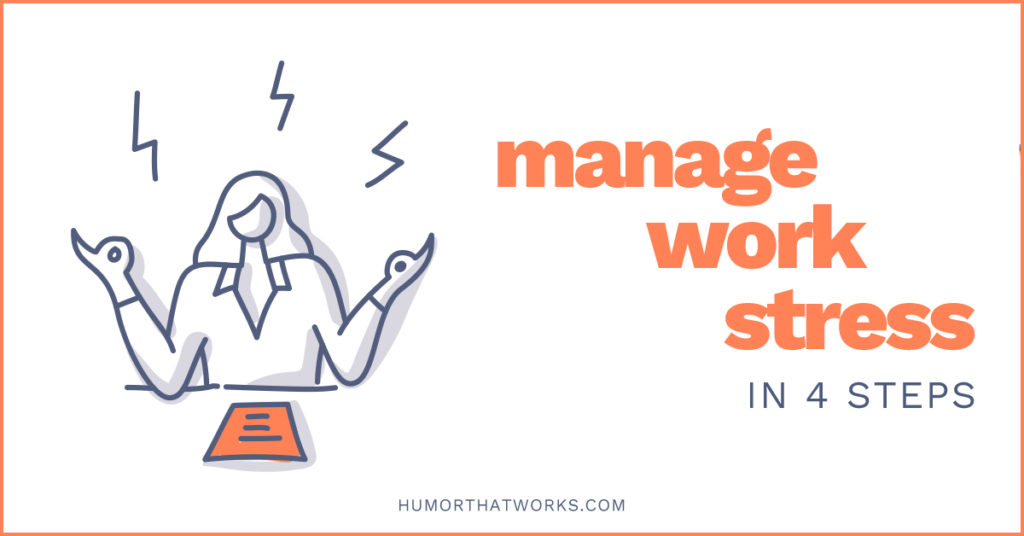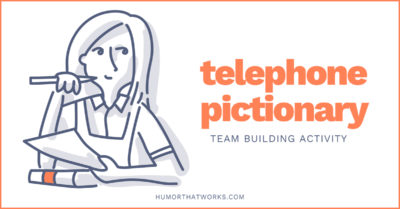Feeling overwhelmed by stress at work? You’re not alone. Over the last six months, we’ve delivered more than 80 virtual programs on a variety of topics: improving virtual communication, building relationships in a remote team, and leading through a crisis. But the #1 request we’re receiving from clients right now is how to deal with stress.
And understandably so. Today’s work environment is perhaps more stressful than any other. After all, these are “unprecedented times” and we know that because of the unprecedented number of times people have called them “unprecedented times.” But it is true. And, here in the United States, 55% of Americans having difficulty coping with stress.
Luckily it doesn’t have to be this way. We humans have a secret weapon in how to handle stress at work, at home, and in life. No, I’m not talking about drugs and alcohol… I’m talking about humor.
For all the negative effects of work stress—high blood pressure, muscle tension, irritable mood swings—humor is one of the best ways to cope with stress. Humor lowers blood pressure, relaxes muscles, and helps ensure the only swings you’re on are the ones at the playground.
So how do you handle the stress of the current environment? Here are four easy steps to managing stress at work:

1. Reject stressful situations.
The simplest but often hardest way to combat stress is to simply avoid it. Reject the activities or environments that cause stress by choosing not to do them or delegating them to someone else. For example, reading the news stresses me out: it’s full of doom, gloom, and things that boomed. So, I stopped listening to news stories first thing in the morning and replaced it with a crossword puzzle or jumping into creative work. I still want to be informed, so I’ve delegated the gathering of important news to other people, namely by reading Next Draft and The Hustle, two daily news curation services that share the news with a bit of humor.
Think about what you can stop doing by creating a to-don’t list of the things on your to-do list that you no longer need to do. Be ruthless. If it’s not something you have to do and it doesn’t bring you joy (now or in the future), cut it or give it to someone else.
2. Reframe work stress.
The second humor strategy for coping with stress is to reframe the situations that cause you stress. When faced with stress at work, there are two ways to react to it. The first is to let it get to you, to succumb to the negativity and allow it to affect you. The second is to find a way to laugh at the stress, to see it as a challenge to overcome, not a way of being.
Simply reframing a stressful situation into a humorous one can help reduce the tension of stress. Rather than dwelling on why a situation is so terrible, find a way to find the humor in it. Why lament over traffic when you can use it as an opportunity for an epic sing-along to the Hamilton soundtrack?
Changing the way you think about a stressful activity or event can help you stop feeling stressed in the first place.
3. Relieve stressful experiences.
It would be naive to believe that you could reframe everything you have to do into something fun. If you’ve just been fired or lost a loved one, it can be difficult to find the fun in the situation. Forcing a smile on your face can sometimes be worse than accepting the reality as it is. But that doesn’t mean the stress has to stay.
The third way to manage stress is to relieve stress after you be stressed. Yes, exercise and meditation are great ways to do this, but so is finding an excuse to laugh. Yes, this is basically a prescription for watching cat videos after a stressful meeting. The important thing is that when something causes you stress, you do something to relieve it.
4. Recharge from stress at work.
No matter how good your sense of humor or how adept you are at the previous strategies, you’re still going to face periods of prolonged stressed (such as when working against an important deadline or spending the weekend with the in-laws).
The fourth way to handle stress at work is by recharging your human batteries, to take a break to recombobulate every now and then. Studies have found that when you take a vacation, you come back with increased feelings of productivity, ability to sleep, positive attitudes toward your job, and way too many Instagram selfies.
But taking a break shouldn’t just be a weekly or monthly activity. It shouldn’t even just be daily; there is strong evidence that points to the value of managing your stress at an hourly level. Research by chronobiologists (perhaps one of the coolest job titles) have found that most people’s minds and bodies need recovery every 90 to 120 minutes. That’s why planned breaks, aka strategic disengagement, is so important.
That’s it. Four easy steps to manage stress at work: reject, reframe, relieve, and recharge. It’s time to put the superpower of humor to work for you so you can be more productive, less stress, and happier.






Drew – love the four R’s, and the subtle crosshairs design “aiming at stress”. Are you coining a new phrase with “you be stressed”?